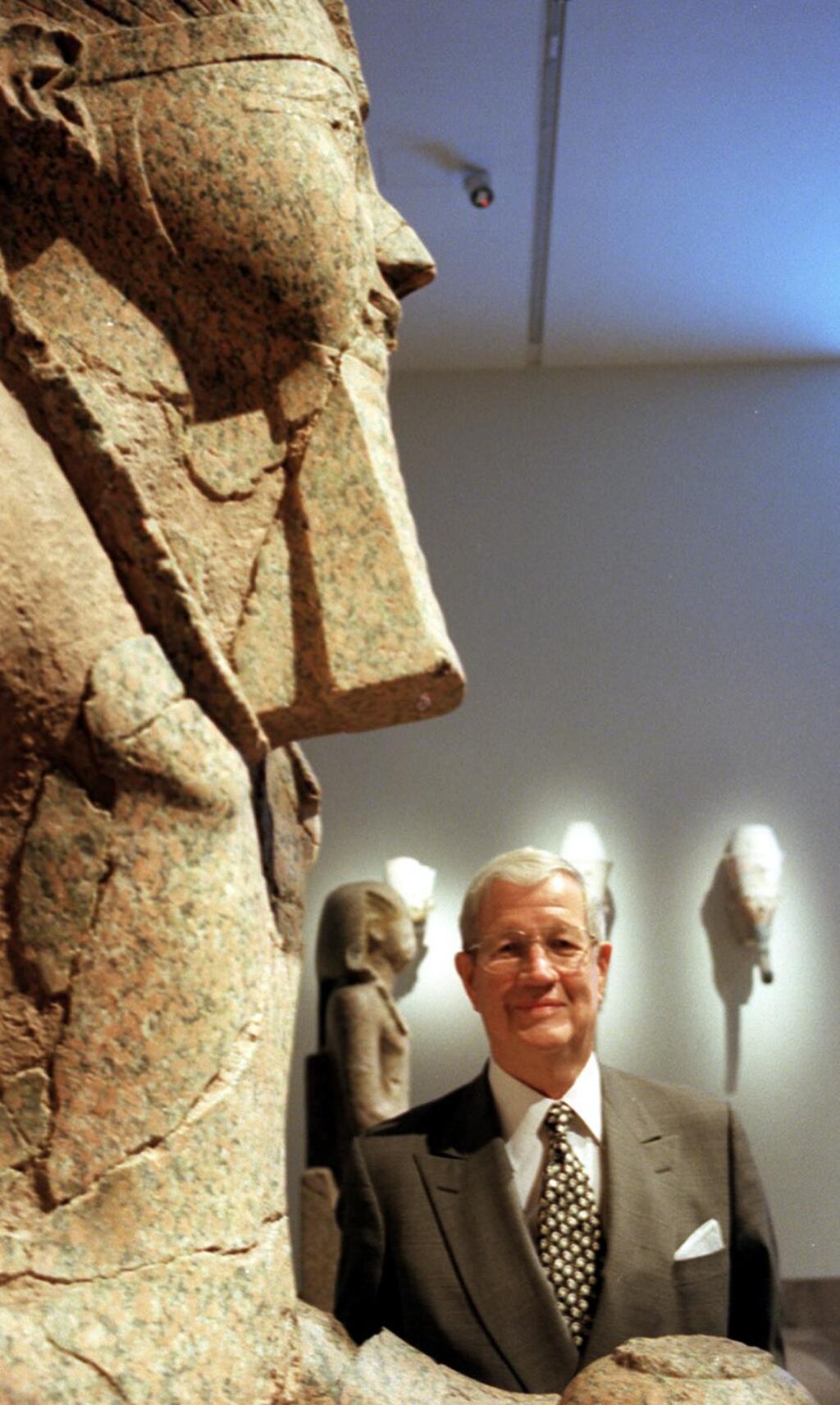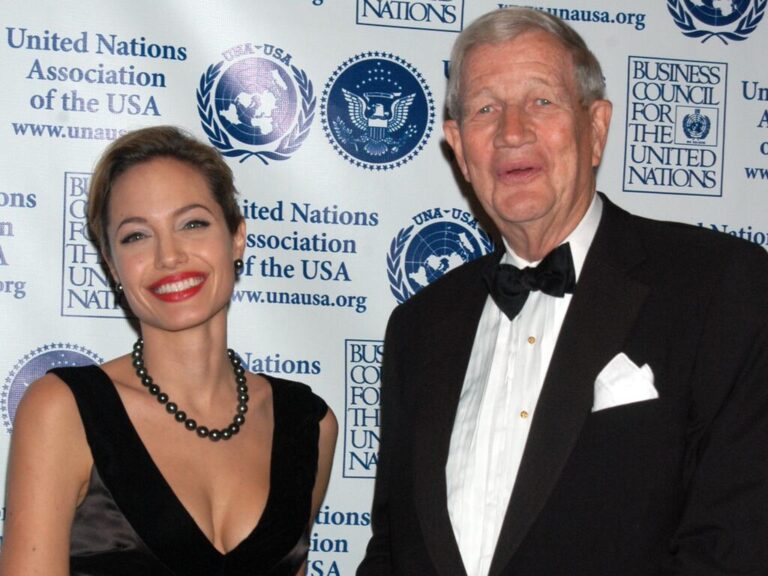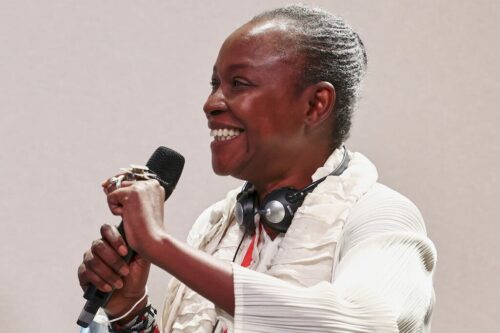William H. Luers, an arts-minded US diplomat who worked to shield the Czech writer and dissident Vaclav Havel from communist reprisals during the Cold War, and who later helped grow the Metropolitan Museum of Art while serving as president of the New York institution, died May 10 at his home in Washington Depot, Conn. He was 95.
The cause was prostate cancer, said his wife, Wendy Luers.
A tall and rangy Illinois native, Mr. Luers operated for years at the intersection between art and diplomacy, working with writers, artists, and other cultural figures in the United States and overseas. Long before the term “soft power” came into vogue, he looked to the arts as a way to exercise American influence, build relationships, and foster understanding, whether as a top envoy in Caracas during the late ’70s oil boom or as an ambassador in Prague shadowed by the secret police.
“It’s precisely where I find one can get most rapidly into a foreign culture,” he told The New York Times in 1985, discussing his love of art. “It’s through talking with and knowing contemporary artists, and learning about the history through art and culture.”
Fluent in Russian, Spanish, and Italian, Mr. Luers spent nearly three decades in the Foreign Service, specializing in Soviet affairs. He held diplomatic postings in Naples and Moscow, was a deputy assistant secretary of state in the Ford and Carter administrations, and was ambassador to Venezuela and then Czechoslovakia before retiring in 1986 to become president of the Met.
For the next 13 years, he managed the administration, budget, community relations, and fund-raising of the country’s largest art museum. He led the institution in tandem with Philippe de Montebello, the Met’s longtime director, in a power-sharing arrangement that was often described as strained.
Mr. Luers coordinated financing for landmark exhibitions, including a 1990 survey of Mexican art, and helped win a historic gift from publisher and philanthropist Walter Annenberg, who agreed to bequeath roughly $1 billion worth of impressionist and post-impressionist paintings.

“He’s indefatigable,” Carl Spielvogel, a Met trustee who later served as ambassador to Slovakia, said in 1999, as Mr. Luers prepared to step down at age 70. “I don’t know many people willing to be out at breakfast, lunch, and dinner seven days a week, but he was. And he was very good at it.”
As an ambassador, Mr. Luers charmed many of America’s most prominent writers and artists, hosting embassy gatherings that drew John Updike, Arthur Miller, William Styron, Peter Matthiessen, Francine du Plessix Gray, and Frank Stella.
Mr. Luers’s wife said that he became convinced of the value of cultural diplomacy in 1963, as a junior officer at the US Embassy in Moscow. Because of his Russian language skills, he had been assigned to accompany John Steinbeck and Edward Albee on a writers’ exchange trip through the Soviet Union, serving as their interpreter and helping them navigate “the bureaucratic morass,” as he later put it.
“One night in Odessa we went to see an opera, ‘Khovanshchina,’ which depicts an enormous tragedy in which everyone is burned up in a fire,” he told the Times in 1997. “That night we went back to our hotel and learned that John F. Kennedy had been shot. The Russians sat up with us that night, and it was quite a moving scene to see them almost as frightened as we were, and so sympathetic.”
Art, he concluded, could offer an opening, even between adversaries.
As ambassador to Venezuela from 1978 to 1982, Mr. Luers sought to distinguish himself from previous envoys who were treated with disdain within the country because of their associations with the US military and business interests. He bought local art, trumpeted his love of Venezuelan culture, and hosted writers including Styron and Updike. He also organized an embassy exhibition of American art, mounting works by Stella and Joan Mitchell.
The show’s opening drew Venezuela’s president, as well as a Caracas journalist who had been critical of Mr. Luers in articles about the oil industry. “Ambassador,” Mr. Luers recalled him saying, “after tonight you can do anything you want with oil. You can get away with anything, you know.”
After being appointed ambassador to Czechoslovakia in 1983, Mr. Luers leveraged his literary connections on behalf of Havel, who had recently spent several years in prison as a result of his pro-democracy efforts.
Fearing that the dissident and playwright might be killed by the communist regime, Mr. Luers launched a publicity campaign on Havel’s behalf, bringing in American writers and dignitaries including Time Inc. editor Henry A. Grunwald and Washington Post Co. chair Katharine Graham. His efforts helped elevate Havel’s profile in the West, providing a bit of diplomatic cover for the writer and his allies in the dissident movement known as Charter 77.
“Havel had ways of talking about the communist system that I thought were uniquely subtle, profound, and ultimately effective,” Mr. Luers said in a 2015 interview with Hamilton College, his alma mater.
Still, Mr. Luers said he had little sense that “this sort of short, shy intellectual” would go on to be elected Czechoslovakia’s president in 1989, after the country’s communist system was peacefully toppled by the Velvet Revolution.
“Bill shone the light on Havel and the other dissidents,” said his wife, Wendy, a former Amnesty International staffer who started the Foundation for a Civil Society, a New York-based nonprofit. “We became very good friends with his brother. I became very close to his wife, Olga. To the point that when he became president, he wore Bill’s tie when he was inaugurated, and she wore my blouse.”
Two months later, in February 1990, the Luers hosted the Czechoslovak president and his wife on a visit to New York City, where Mr. Luers gave Havel a personal tour of his new workplace, the Met.
Havel, according to the Times, “wanted to see the Abstract Expressionist paintings.”
The youngest of three children, William Henry Luers was born in Springfield, Ill., on May 15, 1929. His mother looked after the home. His father, the son of a German immigrant, was a banker who served in World War I and again in World War II, when he was wrongly accused of spying for the Nazis while serving as an officer in the Army Air Forces. He was exonerated after a year-long military investigation, according to Mr. Luers.
Mr. Luers studied math and science at Hamilton College in New York, received a bachelor’s degree in 1951 and enrolled in graduate school at Northwestern University, where he planned to study for a career in chemical engineering. After taking classes with literary critic Richard Ellmann, an authority on James Joyce, he decided to focus on the humanities instead. He studied philosophy, developed an interest in Russian history and the influence of Marxism, and briefly contemplated becoming an Episcopal priest.
During the Korean War, Mr. Luers joined the Navy, serving as an officer for about five years beginning in 1952. He joined the Foreign Service in 1957, while looking for a way to travel to Moscow, and received a master’s degree in Russian studies from Columbia University the next year.
Mr. Luers had four children from his first marriage, to Jane Fuller, which ended in divorce. In 1979, he married Wendy Woods Turnbull.
In addition to his wife, he leaves three of his children, David and Will Luers and Amy Lynd Luers; two stepdaughters, Ramsay and Connor Turnbull; and 10 grandchildren. His son Mark Luers died of esophageal cancer in 2020.
Mr. Luers remained active in diplomatic circles – occasionally, he joked, he used his former title, ambassador, “to get dinner reservations” – and wrote op-eds about foreign affairs for publications including The Washington Post and the Times.
He also taught at Columbia University and helped lead the Iran Project, a group that promotes the use the use of diplomacy to prevent Tehran from acquiring a nuclear weapon. Last year, he published a memoir, “Uncommon Company,” in which he lamented “the static and toxic state of America today.”
“My message to the leaders of this country is clear: Diplomacy works,” he wrote. “We must talk to the other. However, until we ourselves can learn to talk with the other who lives next door, until we learn to listen with civility to family and friends and strangers alike, it will be impossible to suggest to other nations that they do the same, but on a global stage.”

